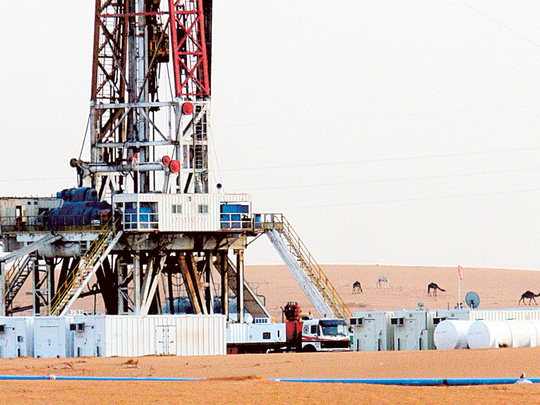
Dubai: Still haunted by its failed attempt to prevent a steep drop in oil prices by slashing production by almost three quarters in the 1980s, the world’s top oil exporter Saudi Arabia is determined not to make the same mistake again.
The oil glut of the 1980s — the early days of the modern crude market and a distant memory for most traders — has resurfaced recently in conversations with Saudi officials and veteran analysts who see it as the defining moment behind the kingdom’s new strategy to protect medium-term market share. While the latest 25 per cent slide in oil prices to below $90 (Dh330.64) a barrel is so far modest compared with the 1980s slump that took crude from $35 to below $10, many observers see similarities in a global market that is on the brink of a pivotal turn from an era of scarcity to one of abundance.
Three decades ago, the spike in prices caused by the 1973 Arab oil embargo and Iran’s 1979 revolution sapped global oil demand, while the discovery of oil offshore in the North Sea spurred a new influx of non-Opec crude. With world markets awash in oil, Saudi Arabia embarked on a strategy of defending prices, which at the time were largely set by exporters rather than the nascent futures market. The kingdom slashed its own output from more than 10 million barrels per day in 1980 to less than 2.5 million bpd in 1985-86.
Other producers failed to follow suit, however, both within the Organisation of the Petroleum Exporting Countries and among new petroleum powers such as Britain and Norway. Prices fell into a years-long slump, leading to 16 years of Saudi budget deficits that left the country deeply in debt.
Finally, in 1985, Riyadh shifted gears, revving up output and cutting prices in a move that triggered a final slump in markets but ultimately paved the way for a gradual recovery.
“The big mistake was that they continued to cut production to try to prop the prices and the price fell anyway,” said analyst Yasser Elguindi of Medley Global Advisors. Instead they should have fought for market share, allowing “higher cost producers to shut in as the price fell — which is what they are doing now.”
Last week, Saudi officials briefed oil market participants in New York on the kingdom’s shift in policy, making clear for the first time that Saudi Arabia is prepared to tolerate a period of lower prices — perhaps as low as $80 a barrel — in order to retain market share, Reuters reported on Monday. Saudi Arabia is not trying to push oil prices down, an oil source said, but is prepared to let the market find its floor and tolerate lower prices until others in Opec commit to action.
It has already cut selling prices to retain Asian customers. Their message is “don’t expect us to somehow shoulder the responsibility for managing the whole oil market,” said Sadad Al Husseini, a former top executive at state-run Saudi Aramco.
Brent crude oil traded below $88 a barrel on Monday, its lowest in almost four years, as traders realize that Saudi Arabia is in no hurry to curb the emerging oil glut.
The grim circumstances of the 1980s dominated the formative years of King Abdullah’s rule, when as de facto regent during the long illness of his predecessor King Fahd, he embarked on painful economic reforms that paved the way for years of growth.
Riyadh this time wants to preempt a price collapse without sacrificing production levels or market share. In the 1980s, it was a drop in US and European consumption coupled with the rise of the North Sea; now it is fears of easing demand from Asia and the unexpected growth of US shale oil.
The net effect is the same: An oil market potentially facing years worth of oversupply, a scenario the Saudis and Opec have not been forced to grapple with since the early 2000s, before the rise of China triggered a decade-long price boom.
Fellow Gulf Arab ally and Opec exporter Kuwait has already said that Opec is unlikely to cut oil production in an effort to prop up prices because such a move would not necessarily be effective. Venezuela became the first member to call for an emergency meeting to defend $100 oil.












